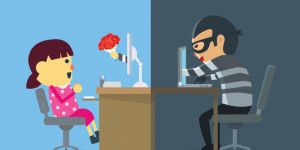Using Social Media

Social media are apps and websites that let us share images, videos, text, music and other content online with our friends. You’ll know websites like snapchat, instagram, facebook, twitter, youtube and TikTok.
These websites are great sources of entertainment, and help us stay connected to our friends. However, having the wrong settings/sharing the wrong things can mean sharing personal details and embarrassing videos/pictures with the wrong people. Social media can also be a tool for criminals and sexual predators to get into contact with children and young people.
Its always worth remembering:
- What you post online is public. Think about how much you want people to know about you
- Keep your personal information private. Think carefully about telling someone your full name, address or what school you go to. Just because you speak to someone online it doesn’t always mean you know them.
- Be careful when using a Webcam. Don’t do anything you wouldn’t want your friends/family to see.
- Don’t meet up with someone from the internet without an adult you trust- People sometimes are pretending when online. If you do meet up with someone make sure it is in a busy public place and with an adult you trust.
- Keep your friends list safe on social media. It’s really tempting to accept as many friend requests or follows as possible but remember, they could be anyone.
- Share with care – once you’ve out something online you’ve lost control of it – it can be copied, shared or edited. Do not post anything that would deliberately upset other people such as embarrassing pictures.
- Use privacy settings
- If your not sure about how to use privacy settings or who you are sharing with speak to your parents or a trusted adult!
Follow these links to contact some of the most popular social media platforms and learn more about blocking and reporting:
Instagram> Snapchat> WhatsApp> Facebook> TikTok>
.png)

Exploitation can also occur through the use of technology. Adults might pretend to be children or young people in order to build a relationship with a younger person. In most cases its not worth talking to someone you don’t know in real life on the internet, but if you have, talk to an adult about it.
Remember, you can always contact Childline on 0800 1111 to talk about cyber-bullying or anything else that has made you feel unsafe, scared or worried online. If you are worried about someone sharing sexual content with you, or trying to get you to share sexual content with them, you can also contact a police organisation called CEOP here.
For more information about using social media safely try these links:
https://www.saferinternet.org.uk/advice-centre/young-people
